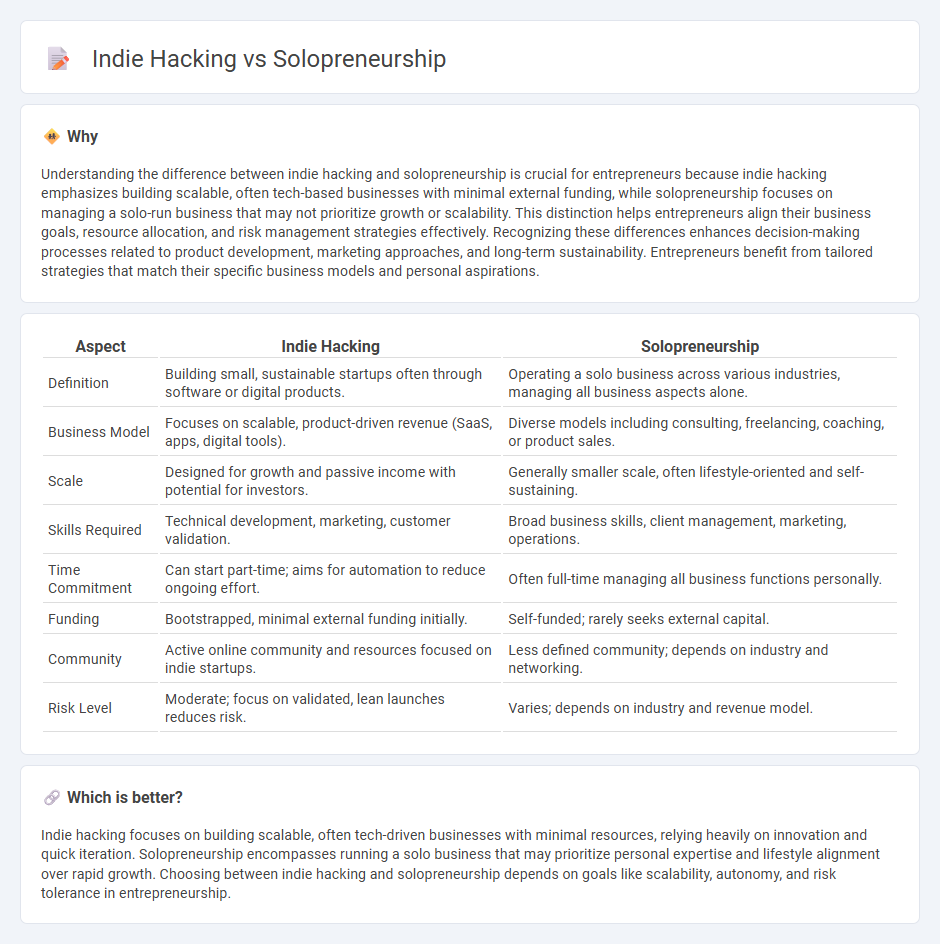
Indie hacking focuses on building scalable, often tech-driven businesses independently, leveraging lean startup methods and rapid iteration to achieve product-market fit. Solopreneurship emphasizes a broader scope of solo business ownership, including service provision, consulting, or creative endeavors, prioritizing personal autonomy and lifestyle flexibility over rapid growth. Discover more about how these distinct approaches shape the entrepreneurial journey and match different ambitions.
Why it is important
Understanding the difference between indie hacking and solopreneurship is crucial for entrepreneurs because indie hacking emphasizes building scalable, often tech-based businesses with minimal external funding, while solopreneurship focuses on managing a solo-run business that may not prioritize growth or scalability. This distinction helps entrepreneurs align their business goals, resource allocation, and risk management strategies effectively. Recognizing these differences enhances decision-making processes related to product development, marketing approaches, and long-term sustainability. Entrepreneurs benefit from tailored strategies that match their specific business models and personal aspirations.
Comparison Table
| Aspect | Indie Hacking | Solopreneurship |
|---|---|---|
| Definition | Building small, sustainable startups often through software or digital products. | Operating a solo business across various industries, managing all business aspects alone. |
| Business Model | Focuses on scalable, product-driven revenue (SaaS, apps, digital tools). | Diverse models including consulting, freelancing, coaching, or product sales. |
| Scale | Designed for growth and passive income with potential for investors. | Generally smaller scale, often lifestyle-oriented and self-sustaining. |
| Skills Required | Technical development, marketing, customer validation. | Broad business skills, client management, marketing, operations. |
| Time Commitment | Can start part-time; aims for automation to reduce ongoing effort. | Often full-time managing all business functions personally. |
| Funding | Bootstrapped, minimal external funding initially. | Self-funded; rarely seeks external capital. |
| Community | Active online community and resources focused on indie startups. | Less defined community; depends on industry and networking. |
| Risk Level | Moderate; focus on validated, lean launches reduces risk. | Varies; depends on industry and revenue model. |
Which is better?
Indie hacking focuses on building scalable, often tech-driven businesses with minimal resources, relying heavily on innovation and quick iteration. Solopreneurship encompasses running a solo business that may prioritize personal expertise and lifestyle alignment over rapid growth. Choosing between indie hacking and solopreneurship depends on goals like scalability, autonomy, and risk tolerance in entrepreneurship.
Connection
Indie hacking and solopreneurship both emphasize building independent businesses with minimal external funding, leveraging personal skills and resources to create profitable ventures. These approaches prioritize autonomy, scalable digital products, and direct customer relationships, enabling entrepreneurs to maintain full control over their operations. The shared focus on lean methodologies and iterative development fosters innovation and sustainable growth for solo founders in the entrepreneurial ecosystem.
Key Terms
Autonomy
Solopreneurship emphasizes complete autonomy, allowing individuals to fully control their business decisions and operations without external interference. Indie hacking also values independence but often involves community collaboration and open-source contributions to enhance innovation and growth. Explore how both pathways prioritize autonomy to choose the best fit for your entrepreneurial journey.
Bootstrapping
Solopreneurship emphasizes complete control and direct management of all business aspects, often relying heavily on bootstrapping to minimize external funding and maximize resourcefulness. Indie hacking centers around building scalable, mostly digital products with an emphasis on rapid experimentation and community support, leveraging bootstrapping to maintain autonomy while validating market fit. Explore more to understand which bootstrapping approach aligns best with your entrepreneurial goals.
Product-Market Fit
Solopreneurship emphasizes building a sustainable business often targeting a broader market, while indie hacking centers on creating lean, innovative products tailored to niche audiences for rapid validation of Product-Market Fit. Achieving precise Product-Market Fit requires solopreneurs to align core business values with customer needs, whereas indie hackers iterate quickly based on direct user feedback and minimal viable products. Discover more about optimizing Product-Market Fit strategies for both solopreneurs and indie hackers to maximize growth potential.
Source and External Links
Solopreneurs: Definition, Business Ideas, And Action Plan - A solopreneur is a business owner with no employees who does not trade time directly for money, often building scalable, potentially passive income businesses such as course creation or affiliate marketing, distinct from freelancers who must charge hourly rates.
The 5 Phases of Solopreneurship | Justin Welsh - Solopreneurship progresses through five distinct phases, each with specific challenges requiring solopreneurs to prioritize tasks fitting their business stage to avoid burnout and improve success.
The Ups and Downs Of Solopreneurship - The Uncaged Life - Solopreneurship involves emotional challenges including self-doubt and isolation, but community support and acknowledging these difficulties are vital for sustainability and mental resilience.
 dowidth.com
dowidth.com